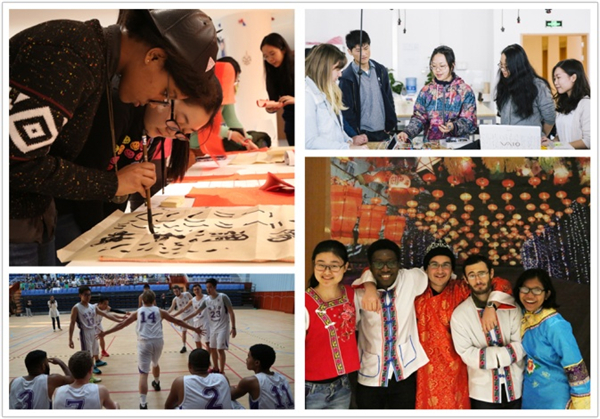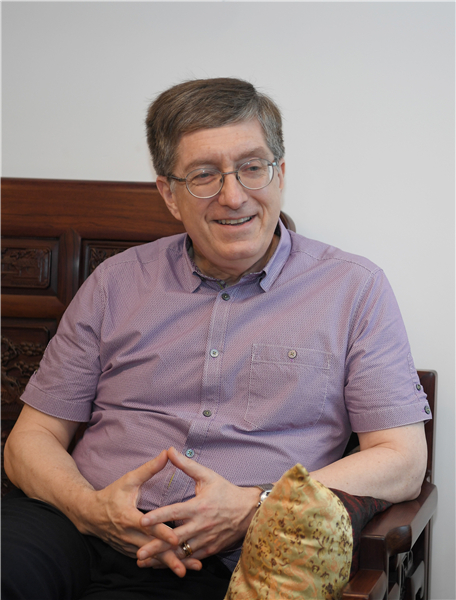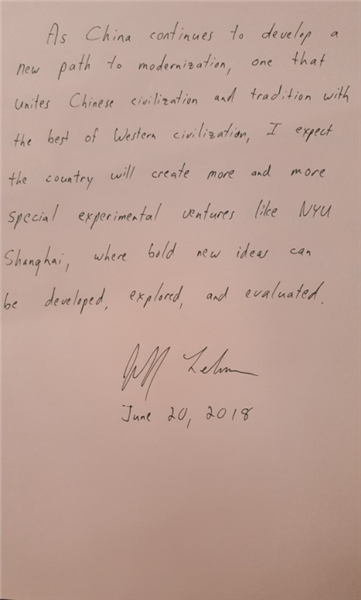On the night of May 22nd and 23rd, Shanghai’s landmark building, the Oriental Pearl Tower, was lit up in violet in honor of the 2018 graduating class of the New York University Shanghai (NYU Shanghai). With a global vision and diverse cultural backgrounds, the young talents are the fruit of China’s "test field" of higher education reform.

(Violet is a symbolic color for NYU Shanghai.[Photo/NYU Shanghai])
One of the cultivators of this "test field" is Jeffrey S. Lehman, Vice Chancellor of NYU Shanghai. Early this year, he was honored as one of the 40 most influential foreign experts in China by the State Administration of Foreign Experts Affairs (SAFEA) for his contribution to China's reform and opening up, especially in Sino-US educational exchanges and cooperation.

(Jeffrey S. Lehman [Photo/NYU Shanghai])
Nurturing cosmopolitan talents
Having worked at the School of International Law of Peking University and NYU Shanghai, Mr. Lehman has a profound understanding of China’s higher education reform and innovation. “For the last 40 years, China has been on an interesting new developmental path to modernization. The idea has been to take Chinese tradition, Chinese civilization and to integrate it with the best of Western civilization. And part of that process of building this new developmental path has been the creation of these educational experiments: The Sino-foreign joint universities.”

(NYU Shanghai provides an international atmosphere for its students.[Photo/NYU Shanghai])
Established in 2012 as the first Sino-US joint university, NYU Shanghai is a result of cooperation between New York University and East China Normal University. Looking back on the past six years, Mr. Lehman spoke highly of the students and teachers who joined the new venture from the very beginning, describing them as "a wonderful group of pioneers."
NYU Shanghai is a witness to the opening up of China’s higher education. According to Mr. Lehman, one of the visions of NYU Shanghai is to nurture within all students a cosmopolitan spirit, which embraces all of the world's cultures and civilizations at the level of the very best universities in the world. “We have half our students coming from china, the other half from the rest of the world. That's unique. So every Chinese student is assigned to a foreign roommate. Every non-Chinese student is assigned to a Chinese roommate. So every day they are spending time talking with someone who grew up in a different culture and sees the world from a slightly different perspective.”

(Mr. Lehman has an interview with Eastday.com.[Photo/Liu Xiaojing])
In the context of China’s opening up and globalization, there has been a boom of Sino-foreign cooperative educational programs of various forms. At present, there are 9 Sino-foreign joint universities with independent legal entity in China (NYU Shanghai, the University of Nottingham Ningbo China, Xi’an Jiaotong-Liverpool University, Duke Kunshan University, Guangdong Technion-Israel Institute of Technology, Wenzhou-Kean University, the Chinese University of Hong Kong in Shenzhen, Beijing Normal University-HongKong Baptist University United International College, and Shenzhen MSU-BIT University), while the number of Sino-foreign joint universities without independent legal entity has exceeded 140.
Envisioning the future of educational cooperation between China and the United States, Mr. Lehman is full of expectation, “We sometimes say that our ambition at NYU Shanghai is to nurture ‘bridge people.’ We want all of our students to be human bridges between countries and between cultures. And I think there will be more hope, there will be more and more experiments like ours.”
Seeking breakthroughs with an experimental spirit
It was two decades ago that Mr. Lehman first came to China. “There was a certain uncertainty about the rest of the world that came from a lack of familiarity. There was a sense that maybe there were things out in other parts of the world that were perfect and that China should feel insecure about parts of China that were imperfect,” said Mr. Lehman. But today’s China in his eyes has completely transformed. “Because of true opening up, people understand much better that there’s no perfect country anywhere. Every country has good aspects and bad aspects. That's fine. And the goal is to be honest and open to understand what's good and bad about all countries, so that you can integrate the good parts, improve your own country, and create a world culture that integrates the best elements from all countries, all cultures all over the world.” And he feels that today in China much more than he did when he first came. He added, “The experience of reform and opening up for China over the past forty years has been vital. It's been transformative. It has been absolutely critical in this process of development and modernization for the nation.”
As for Shanghai’s role in the process, Mr. Lehman said, “Shanghai is in many ways the most cosmopolitan city in all of China, I think. It is a center for commerce, a center for finance, and a center for trade. Shanghai is a gateway city that links China to the other great cities of the world and other countries. Every country needs a gateway city like Shanghai.”
What’s more, he thinks that people in Shanghai are famous for their interests. They're hungry and curious about the world, making Shanghai a wonderful environment in which to develop true cosmopolitan, innovative and creative thinkers. He can feel the vitality, especially in the heart of Lujiazui.
At the end of the interview, Mr. Lehman talked with earnestness about China’s educational reform, “The commitment to be experimental, to be brave, to be fearless, to be willing to make mistakes is absolutely key to building a world-class educational structure. And I think it is really important that, especially when the world around us is changing so quickly, that Chinese universities continue to evolve as they have been more in the direction of an experimental learning culture, where the notion is students must be active learners, they must be shown how to ask their own questions, how to pose their own challenges and develop their own answers. Even if they're wrong, they have to welcome mistakes. I think what is going on right now in Chinese universities is to bring about that kind of cultural shift, to bring about that kind of a philosophy where everyone is told: You must not be afraid to fail. We learn from our failures. And that’s how breakthroughs are made, and I think that is really where Chinese universities are headed.”

(Wishes for the ongoing process of reform and opening up from Mr. Lehman)
